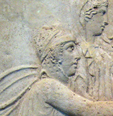INTRODUCTORY NOTE. — The publication of this article does not want to be a new contribution to the textual criticism of Pindar, not at all. The true argument of this page arises from the fun and interesting circumstances, which at the time prevented the publication of our article. After the final draft, which dates back to 1973, we sent this early work to several reviews with the intent to have it published. For many intuitable reasons this kind of contact requires a lot of time, so some years passed before we turned to the review “Latinitas”. The then editor in chief, Ettore Paratore, a well-renowned Latin scholar, had already published our Adnotatiuncula Tulliana and, therefore, we were hoping to count on his willingness, which he expressed us explicitly in a communication of September 21, 1976. But, on January 16, 1977 we received a very fun letter—a real icing on the cake—whose whole text we transcribe here below.
Roma, January 16, 1977
Dear Mr. Illiceramius,
I am really mortified not to be able to do anything for you any more, but not for the reasons that have damaged you till now and, maybe, you suspect in my demeanour, but for the simple motive that at the review Latinitas they gave me the boot. Since the Pope [i.e. Paul VI] has constituted the foundation Latinitas with a capital of 50 million—a capital certainly not hefty, but still attractive for the one who hitherto had been used to run into difficulties in balancing revenue and expenses—the most reverend monsignors, who even before could not stand me, thought it was sacrilegious that a vile layman, as editor in chief of the review, could lay hands on a budget of such a sort, and they played a priest joke [i.e. a dirty trick] on me, so that they excluded me from the executive board, and removed me from the job of moderator. And to think that I had directed the review for years for the sake of the art and devotion to the Church, without catching a penny.
Therefore, your article has been submitted to the will of the abbot Egger and monsignor Del Ton. I do not know what end they keep aside for it.
I regret having to give you this unwelcome news for both of us. I cordially say you good-bye returning greetings.
Ettore Paratore
| (If you are curious to read the article “Quid in mensis?”, click on the icon: ➜) | 
|
FINAL NOTE. – The very amusing letter of Ettore Paratore does not need any comment! As for our article—we repeat it—we do not have any philological end; it only supports the letter. To tell the truth, after so many years we would have to do several remarks to that student n both the merits of the question and the Latin prose, remarks which we omit for self-evident reasons. It is enough to say that in a new Pindar's edition we would place a crux of locus desperatus before δεύτατα, limiting ourselves to assume an intensive use of the expression ἀμφὶ δεύτατα which, echoing δεύτερα, would get the meaning not simply of "als Nachspeise"—according to O. Werner's translation—, that is as dessert, but even of "als die süßte Nachspeise", that is as the most delicious dessert, bearing always in mind the warning of Horatius: Pindarum quisquis studet aemulari. ceratis... nititur pennis vitreo daturus nomina ponto (Od. 4,21-4).
[© Franco Luigi Viero]
